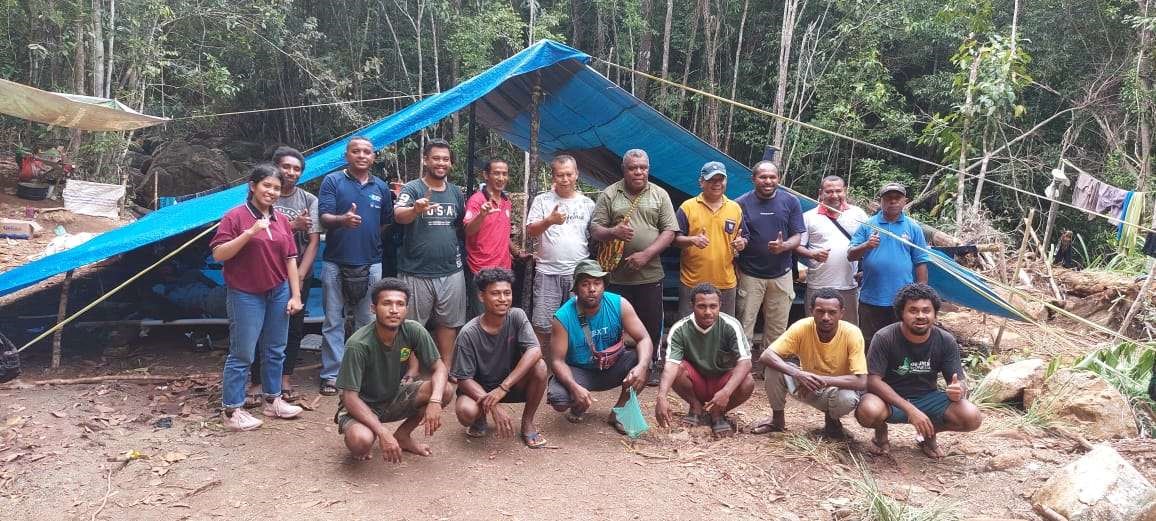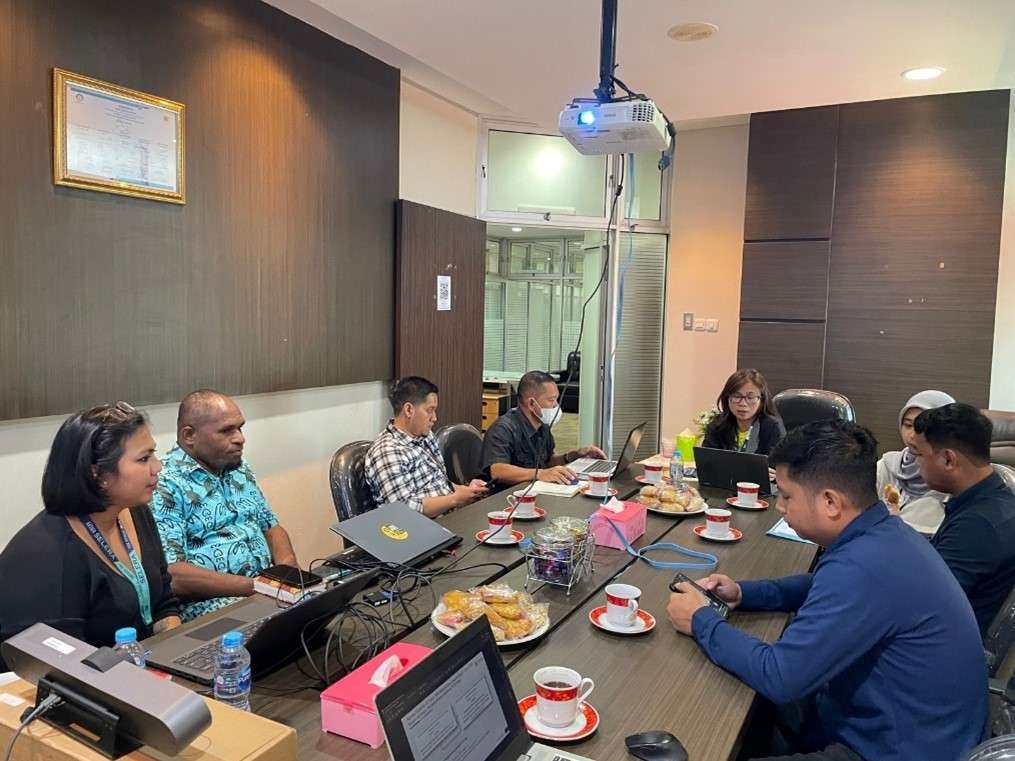FORCLIME
Forests and Climate Change ProgrammeTechnical Cooperation (TC Module)

Select your language

FORCLIME has been collaborating with the Ottow Geissler University Papua (UOGP) since 2021 in relation to several activities, including the establishment of the Nyei Toro Educational Forest and the development of a Center of Excellence (CoE) for the Geographic Information System and mapping. In order to extend this collaboration, FORCLIME held a meeting with UOGP at the UOGP Campus, Jayapura on 2 February 2023. The meeting was chaired by the Secretary of the Forestry Program at the Faculty of Agriculture, Forestry and Marine Science of UOGP, Mr. Frank Leonardo Apituley, S.Hut., M.Si.
The establishment of the Nyei Toro Educational Forest is currently in the management plan drafting stage. Moreover, UOGP is also collaborating with the Indonesian National Research Agency (BRIN) in Manokwari to conduct an inventory of biogeophysical potential, the results of which will be used as basic data during preparations of a new management plan. In addition to these activities, UOGP will also contribute to community empowerment programmes in the villages of Dosai and Tablasupa during 2023. These are BBKSDA (conservation agency) Papua-assisted villages that are also being supported by FORCLIME.
“We would like to express our gratitude for the various contributions that have been made this year through the Forestry Study Program of the Faculty of Agriculture, Forestry and Marine Sciences at UOGP. These contributions encompass community service in villages supported by FORCLIME and are a part of the Tri Dharma (community programme) of higher education,” explained Mr. Frank Leonardo.
For more information, please contact:
Ruben Yogi, Junior Advisor for GIS and Mapping
Mohammad Sidiq, Strategic Area Manager for Sustainable Forest Management and Coordinator for Papua and West Papua Provinces

During the September - December 2022 period, FORCLIME completed a Training Needs Assessment (TNA) of Social Forestry Facilitators and Forestry Extension Workers, as well as members of the Social Forestry Acceleration Working Group (Pokja PPS) across three provinces of its working area, specifically: Central Sulawesi, Papua and West Papua. The results of this TNA are expected to be used as a reference by the Center for Education and Training for Environment and Forestry (Center for Human Resources Training for Environment and Forestry), as well as Environmental and Forestry Training Centers operating within the regions (Environmental and Forestry Training Centers), the Provincial Forestry Service, the Social Forestry Office, the Environmental Partnership and other stakeholders to develop capacity building programs for Social Forestry assistants and Pokja PPS administrators working within the three provinces.
The expertise competencies that are being studied in relation to Social Forestry assistants and forestry extension workers include:
1. Competence regarding the conducting of facilitation and counseling.
2. Managerial competence.
3. Technical competence relating to assistance for community members prior to their securing social forestry permits.
4. Technical competence relating to community assistance after social forestry permits have been secured, including institutional management, area management and business management.
On February 1, 2023, the GIZ Team presented the TNA results online to the Makassar Environmental and Forestry Training Center. This presentation is seen as important due to the fact that the TNA coverage area (Central Sulawesi, Papua and West Papua) makes up part of the Training Center’s service area. The results of the competency level study have revealed that PS assistants and forestry extension workers operating in Central Sulawesi Province generally have much higher levels of competency than their counterparts in West Papua and Papua. This generally means that the need for capacity building among Social Forestry assistants in Papua and West Papua is more urgent than capacity building for Social Forestry assistants in Central Sulawesi. The non-training issues that commonly arise during Social Forestry assistance activities encompass the remoteness of assisted areas, as well as problems relating to accessibility and limited operational budgets, which make it difficult to provide intensive assistance.
As a follow-up to this webinar, the results of the TNA will be presented at the national level at an event that will be attended by the Center for Human Resource Training for Environment and Forestry, as well as other by technical directorates in charge of Social Forestry at the Ministry of Environment and Forestry.
For more information, please contact:
Edy Marbyanto, Strategic Area Manager for Human Capacity Development

To demonstrate how renewable energy can play a role in meeting the electrical power requirements of office operations, as well as how rooftops offer an excellent place in which to install the solar panels required by solar-power systems, FORCLIME is preparing to install a solar-panel system at its office in Jayapura. Solar power is becoming an increasingly important option around the world and offers an alternative to fossil fuels that is a non-polluting, clean, renewable and environmentally friendly source of energy and that many believe will power our global future. Indeed, solar panels can offer savings of 15% - 50% on electricity bills, depending on their specifications.
To prepare for the installation of the new solar panel system, FORCLIME held a coordination meeting with PT PLN Papua and West Papua at PLN’s Regional Papua Office in Jayapura on 26 January 2023. The meeting addressed the permits required to install solar panel (solar PV) systems and the compatibility of solar PV equipment with PLN’s existing infrastructure.
“PLN fully supports the carbon reduction project currently being pursued by the Forestry and Environment Service office as a pioneering green initiative in Jayapura,” explained Ms. Laurence from the Marketing and Business Division of PT PLN Papua and West Papua during the meeting.
The FORCLIME office enjoys an in-kind contribution from the Papua Province Forestry and Environment Service as a working partner within the province. In addition, the installation of solar power plants (PLTS) represents an important element of the government’s strategy to increase the share of renewable energy in Indonesia’s energy mix to 23% by 2025. Indeed, government buildings at the national level are starting to use PLTS as part of a number of renewable energy pilots. The average age of solar panels can reach as high as 25 years, after which time they can still be used. Meanwhile, the use of solar panels can have a significant impact in terms of reducing the impact of the ongoing climate crisis. For example, the use of 1,000 kWh of electricity generated through solar panels is equivalent to a reduction of over 1,400 pounds of CO2, 8 pounds of sulfur dioxide and 5 pounds of nitrogen oxide. At longer timeframes, the use of solar panels for 25 years can potentially reduce CO2 emissions by up to 100 tons, which is a relatively high amount.
FORCLIME will start installing solar PV at the end of March 2023. In addition, a dashboard will also be installed at the Papua Province Forestry and Environment Service office that will display information on estimated energy use, active applications, energy intent, estimated carbon emissions, cost predictions and cost changes.
For more information, please contact:
Ruben Yogi, Junior Adviser for GIS and Forest Mapping
Windy Kusumawati, Junior Administrative Specialist
Mohammad Sidiq, Strategic Area Manager for Sustainable Forest Management and Coordinator for Papua and West Papua Provinces


